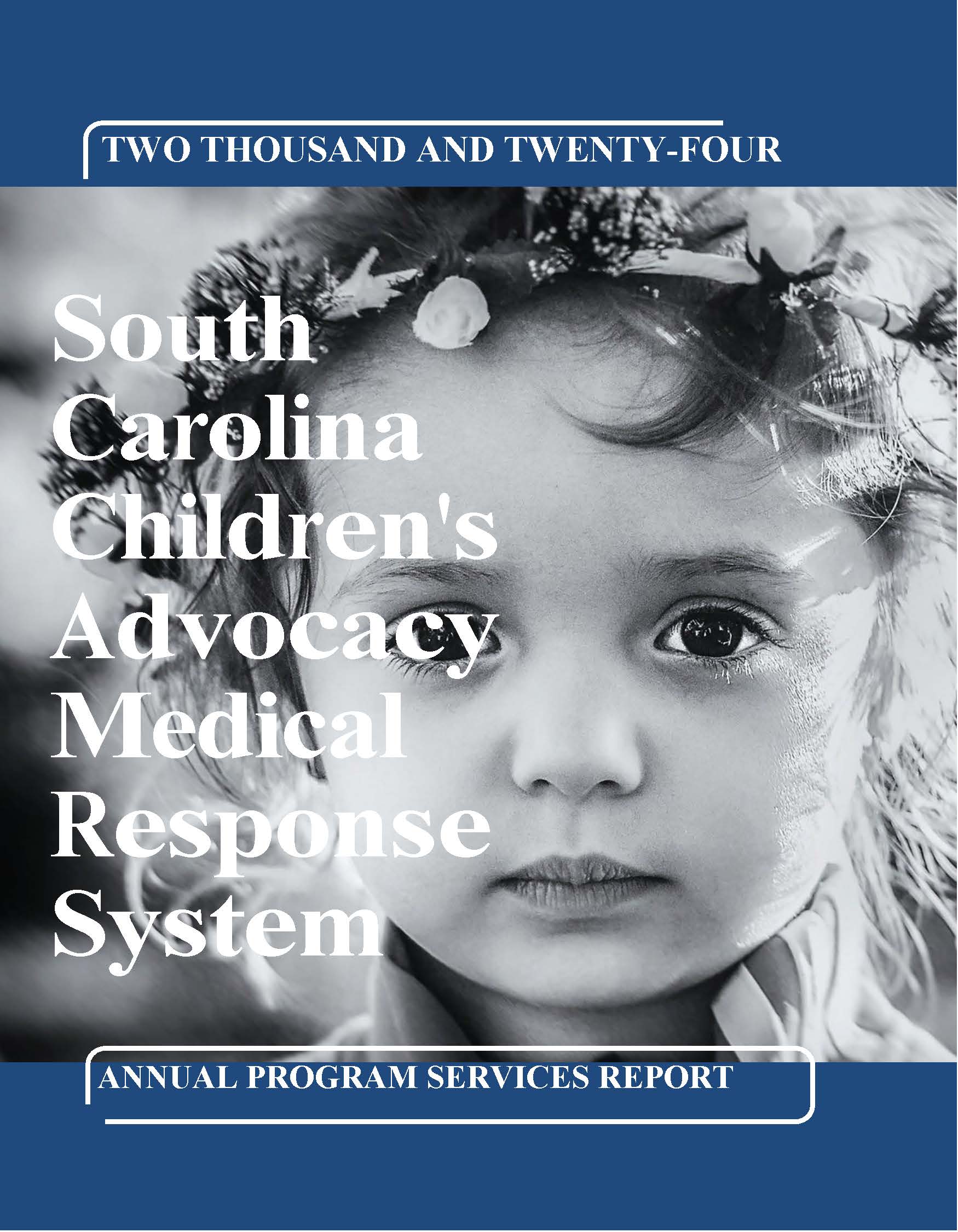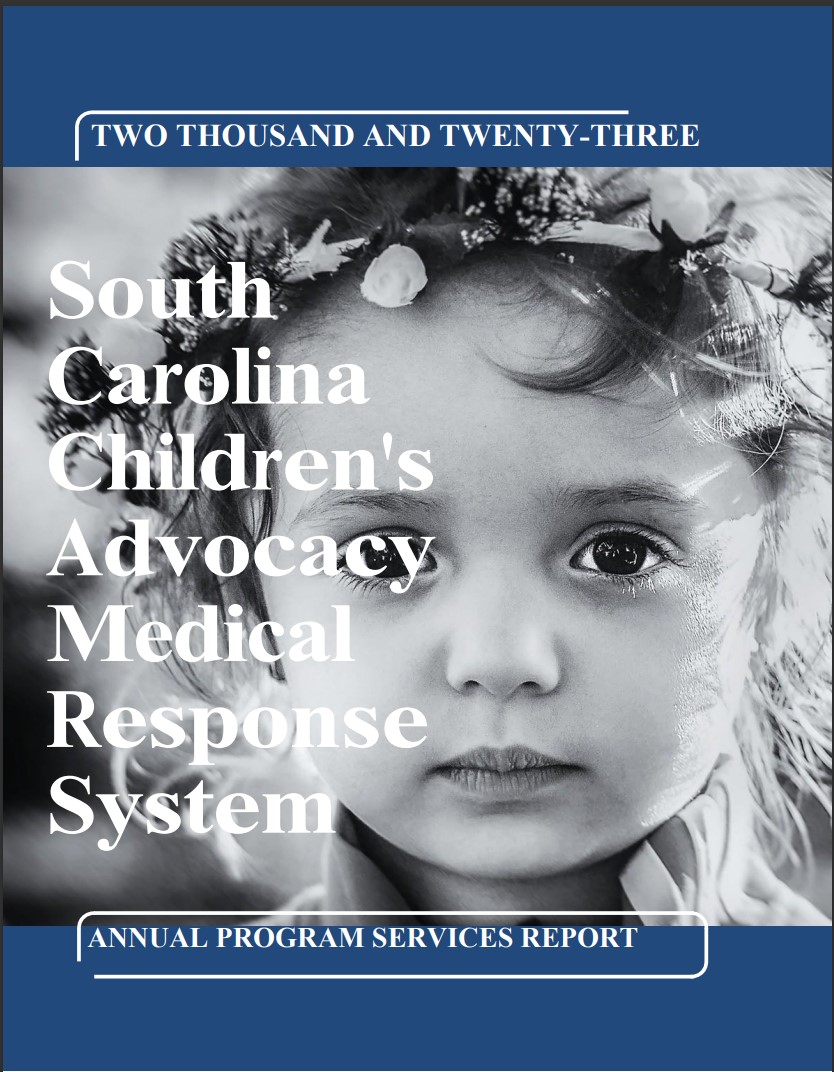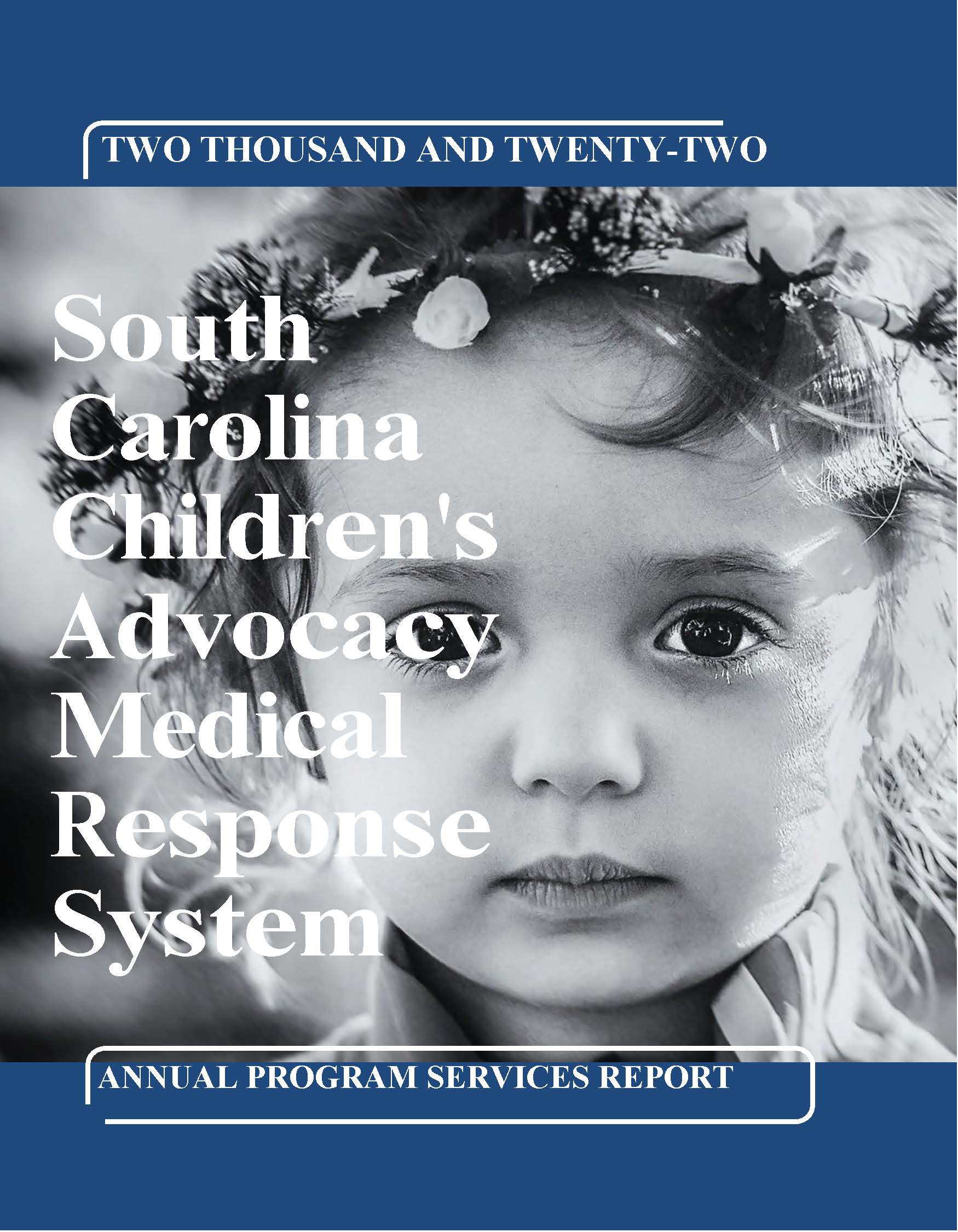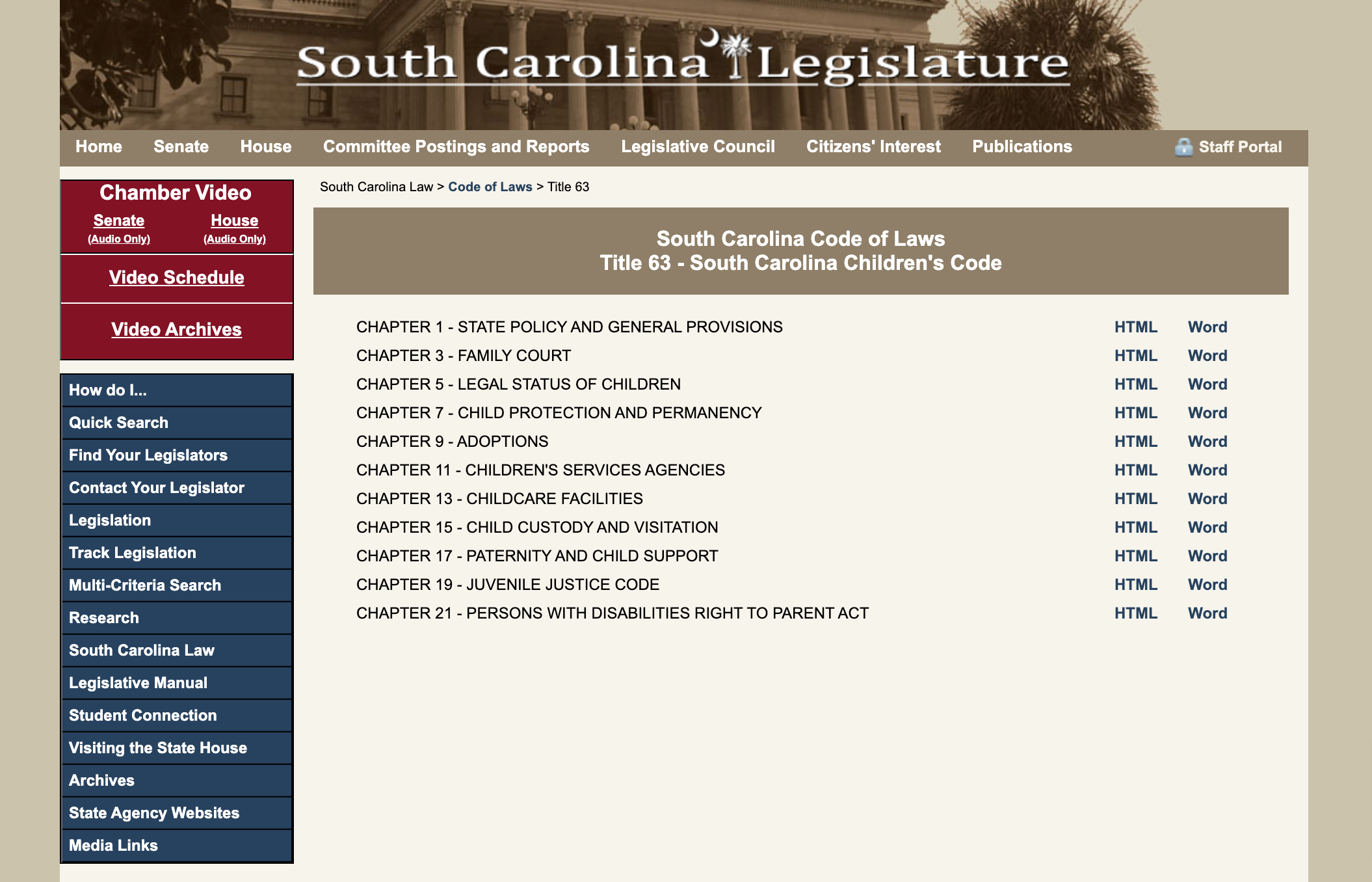
Home
Home
About Us
About Us
Child Abuse Pediatrics Medical Providers
Child Abuse Pediatrics Medical Providers
Report Child Abuse
Report Child Abuse
ASA Statewide Protocol
ASA STATEWIDE PROTOCOL
Member Login
Member Login
Our Story
Over the Years
2003
SC Children’s Advocacy Medical Response System Formed
In December 2003, the University of South Carolina School of Medicine, Department of Pediatrics obtained a 3-year grant from the Duke Endowment to fund the initial stages of a statewide program to address the shortage and training of medical providers specializing in the medical assessment of child abuse and neglect (CAN) and the disparity in quality and delivery of these services. This program is known as the SC Children’s Advocacy Medical Response System (SCCAMRS).
2007
DHHS Recognized need to collaborate with SC Children’s Advocacy Medical Response System
In July 2007, the South Carolina Department of Health and Human Services, recognizing the complexity of the medical services required for the assessment of child maltreatment and the need for the continued enhancement of the quality and availability of such services to their Medicaid eligible child population, added their collaboration and support to the SCCAMRS framework.
2009 – 2010
South Carolina General Assembly funds providers qualified by SC Children’s Advocacy Medical Response System
At the start of the state fiscal year 2009 – 2010, the South Carolina General Assembly allocated recurring state funds within the University of South Carolina annual budget to support the delivery of statewide CAN medical services by medical providers qualified by the SCCAMRS program office to provide such services.
2014
South Carolina General Assembly enacted law –SC §63-11-400
2025
South Carolina Governor signed bill S 276 to rename SCCAMRS to SC Child Abuse and Neglect Network
In May 2025, an act to Amend the SC Code of Laws by amending sections –SC §63-11-400, §63-11-410, and §63-11-420 – all relating to the SCCAMRS Act, so as to rename the act the “South Carolina Child Abuse and Neglect Network” and to make conforming changes.
The SC Children’s Advocacy Medical Response System has created a statewide network of qualified medical providers with extensive training in child abuse medicine, proper collection of evidence, child abuse law and the provision of responsible medical expert testimony for family and criminal court proceedings. They work closely with the state’s children’s hospitals, Children’s Advocacy Centers, The South Carolina Department of Social Services (SC DSS), law enforcement agencies, solicitors and defense attorneys in the assessment, investigation and prosecution of child abuse. The SC Child Abuse and Neglect Network will continue this work care for children.
Annual Reports

2024 Annual Program Service Report

2023 Annual Program Service Report

2022 Annual Program Service Report

2021 Annual Program Service Report
Understanding Common Forensic Terms
Pediatric Forensic Medical Evaluation
Consists of a complete and thorough medical history from the child (if verbal) and caregivers and a head to toe physical examination, including the anogenital area. The evaluation may also include diagnostic laboratory tests, radiology studies and photo-documentation of findings, if applicable.
Purpose:
- To assess the physical, developmental, behavioral and mental health of the child and identify unmet needs
- To evaluate the child’s clinical findings or injuries and determine if such findings are physical evidence of abuse or from a non-abuse related medical condition
- To screen for sexually transmitted infections (STI), when appropriate, to diagnose and treat if an infection is identified and then to interpret the significance of such infections for investigatory agencies
- To answer questions about the child’s physical wellbeing, and possible prognosis or outcome and provide recommendations for treatment
- To provide accurate documentation for legal purposes and explain to investigatory agencies, a lay jury and judge the results of the evaluation and medical opinion as to the likelihood of abuse. Also, in the absence of physical findings, provide expert opinion or testimony to explain this lack of medical evidence.
Acute Sexual Assault and Forensic Evidentiary Exam
A child 11 years of age or younger presenting within 72 hours or an adolescent presenting within 96 hours from an incident of sexual assault require an emergent exam for evidence collection (formerly known as a rape kit) and to identify, document and assess anogenital injuries. This evidentiary exam is usually conducted in hospital emergency rooms by trained hospital staff or a Sexual Assault Nurse Examiner (SANE).
A SANE with a pediatric designation/certification (SANE-P) is a registered nurse who has received education and clinical training in the collection of forensic evidence, and treatment of the immediate needs of the sexually assaulted pediatric and adolescent victim (17 years of age and younger).
Foster Care Entrance Evaluations
At the request of the SC Department of Social Services (DSS), upon entering the Foster Care System, a child receives a comprehensive medical evaluation to assess his/her physical and mental health as well as developmental and behavioral needs.
Child Abuse Pediatrician (CAP)
A physician with training, experience and skills in evaluating children who may be victims of abuse or neglect. After graduation from medical school, the Child Abuse Pediatrician must complete:
- Three or four years of residency training in the medical care of children.
- Three years of fellowship/subspecialty training in child abuse pediatrics.
- Obtain certification for the subspecialty from the American Board of Pediatrics.
Child abuse pediatricians often work within a multidisciplinary team that includes other healthcare providers, hospital staff, child protective service agency workers and law enforcement personnel to gather information and make sure that all agencies involved understand the medical concerns related to the child. They carefully review information about the child and why the concern for abuse exists. An evaluation may include, as well, speaking to professionals involved in the care of the child, such as the child’s primary care doctor, subspecialty physician, and/or therapist.
In addition, child abuse pediatricians often testify in court to help a judge and jury understand a child’s medical concerns and injuries (or lack of) and what they mean.
SCCANN Qualified Medical Provider
A physician, nurse practitioner or physician assistant who has completed the training standards set forth by the program to participate in the delivery of medical evaluations for child abuse and neglect. These providers come from specialties such as General Pediatrics, Family Medicine, Emergency Medicine or Acute Primary Care. Properly training these providers to perform forensic medical evaluations for non-complex physical and sexual abuse cases and participate in court proceedings takes an average of six (6) to twelve (12) months.
Children's Advocacy Center (CAC)
A multidisciplinary, child-centered approach to the investigation, assessment and treatment of suspected child victims of abuse through the coordinated provision of forensic interviews, medical evaluations, mental health assessments/ counseling, victim advocacy services and case review.
Multidisciplinary Team (MDT)
The cornerstone of the Children’s Advocacy Center. A group of professionals from specific disciplines – Law Enforcement Agencies, Child Protective Services case workers, medical providers, mental health providers, victim advocates and prosecutors who collaborate from the point of report and throughout a child and family’s involvement with the judicial system.
SC Code of Laws
Identifying and Reporting Child Abuse and Neglect
| SC Children’s Code — Title 63 | ||
| 63-7-20 | Definitions | |
| 63-7-310 | Personnel Required to Report Child Maltreatment | |
| 63-7-370 | Domestic violence reporting | |
| 63-7-380 | Photos and x-rays without parental consent; release of medical records | |
| 63-7-1990 | Confidentiality and release of records and information | |
| 63-7-40 | Safe Haven for Abandoned Babies | |
| 63-5-70 | Unlawful conduct towards a child | |

South Carolina Department of Social Services
Do you have a child with an allegation of abuse or neglect?
Who Should You Refer for a Medical Evaluation
What a DSS CPS Case Worker Needs to Bring or Send to an Appointment for a Medical Evaluation at a Children’s Advocacy Center (CAC):
How to Notify a Child Abuse Pediatrician (CAP) When Convening a Child Fatality Review Committee:
Guide for How to Contact CAP for Child Fatality Review Committee